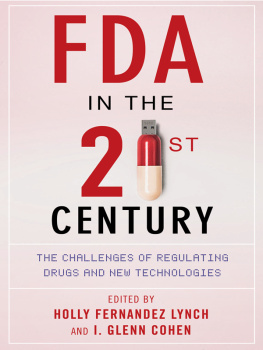FDA IN THE TWENTY-FIRST CENTURY
FDA
in the
TWENTY-FIRST
CENTURY
The Challenges of Regulating Drugs and New Technologies
EDITED BY
Holly Fernandez Lynch
and I. Glenn Cohen
Columbia University Press
New York
Columbia University Press
Publishers Since 1893
New York Chichester, West Sussex
cup.columbia.edu
Copyright 2015 Columbia University Press
All rights reserved
E-ISBN 978-0-231-54007-0
Library of Congress Cataloging-in-Publication Data
FDA in the twenty-first century : the challenges of regulating drugs and new technologies / Edited by Holly Fernandez Lynch and I. Glenn Cohen.
pages cm
Includes bibliographical references and index.
ISBN 978-0-231-17118-2 (cloth : alk. paper) ISBN 978-0-231-54007-0 (e-book)
1. United States. Food and Drug Administration.
2. DrugsLaw and legislationUnited States.
I. Lynch, Holly Fernandez, editor.
II. Cohen, I. Glenn, editor.
III. Title: Food and Drug Administration in the twenty-first century.
KF3871.F34 2015
363.19'20973dc23
2015001340
A Columbia University Press E-book.
CUP would be pleased to hear about your reading experience with this e-book at .
Cover design: Noah Arlow
References to websites (URLs) were accurate at the time of writing. Neither the author nor Columbia University Press is responsible for URLs that may have expired or changed since the manuscript was prepared.
To Philip Katz,
for nurturing a young associates interest in FDA,
even if she didnt know anything about anything.
HFL
To Auntie Choco and Lily,
redheads in Heaven whom I will never forget.
IGC
Contents
Holly Fernandez Lynch and I. Glenn Cohen
Peter Barton Hutt
Holly Fernandez Lynch
Howard Sklamberg and Jennifer Devine
Lewis A. Grossman
Theodore W. Ruger
Barbara J. Evans
Christopher Robertson
Alla Digilova, Rebecca Li, Mark Barnes, and Barbara Bierer
Genevieve Pham-Kanter
Katrice Bridges Copeland
Patrick OLeary
I. Glenn Cohen
Aaron S. Kesselheim and Michelle M. Mello
Christopher Robertson
Coleen Klasmeier and Martin H. Redish
W. Nicholson Price II
R. Alta Charo
Shannon Gibson and Trudo Lemmens
Efthimios Parasidis
R. Alta Charo
Daniel Carpenter, Jeremy Greene, and Susan Moffitt
Geoffrey Levitt
W. Nicholson Price II
Benjamin N. Roin
Kate Greenwood
Marie Boyd
Arti Rai
Henry Grabowski and Erika Lietzan
Frances H. Miller
Nathan Cortez
Margaret Foster Riley
Elizabeth R. Pike and Kayte Spector-Bagdady
Andrew English, David Rosenberg, and Huaou Yan
Jonathan Kahn
A BOOK like this could not have happened without the support and assistance of a number of people. We thank Cristine Hutchison-Jones for helping us mount the original conference that gave rise to this volume, as well as Nicholson Price and Jeffrey Skopek for their assistance with the conference. Louis Fisher and Thomas Blackmon helped us line edit and format the entire book, acting really as deputy editors. We are always grateful to Harvard Law School and the Petrie-Flom Center for Health Law Policy, Biotechnology, and Bioethics for their support of our activities. I. Glenn Cohen also thanks the Greenwall Foundation Faculty Scholar in Bioethics program for its financial and intellectual support during the gestation of this book. And last, but certainly not least, we thank all of our contributors for their tremendous efforts.
HOLLY FERNANDEZ LYNCH AND I. GLENN COHEN
Dont bother about being modern. Unfortunately it is the one thing that, whatever you do, you cannot avoid.
SALVADOR DAL
HOW SHOULD FDA regulate stem-cell therapies? Genetic testing? How can it discourage off-label promotion without violating the First Amendment? How should the interface between patent law and market exclusivity differ for biologics rather than small molecules? These are but a smattering of the new and enduring challenges facing the U.S. Food and Drug Administration (FDA) as the agency endeavors to successfully regulate drugs and new technologies in todays world, and a quick sample of the issues tackled in this book. The books contributing authors grapple with a wide range of challenges, from globalization to corporate integrity to personalized medicine to mobile health and beyond. Often they offer competing visions of what success for the agency would look like and the best ways to achieve it.
The basic metrics of success are clear from FDAs authorizing statute, which focuses on ensuring that drugs and devices are both safe and effective. However, a truly successful agency must balance getting promising products to market quickly against rigorously protecting patients across a products entire life cycle, as well as encouraging innovation, ensuring patients have adequate information to make their own decisions, and remaining nimble enough to confront a world that could not even be imagined at the time the agency first ventured down the path of drug regulation.
To understand the magnitude of the challenge before todays FDA, consider what the world looked like in 1906, the year that Congress passed the original Federal Food and Drugs Act. The Wright Brothers had just invented the first successful airplane, and the globalization of medical technologies was so far off as to be even beyond a pipe dream, although interstate commerce posed many important challenges on its own. Snake oil flourished, and the most fundamental problem was simply making sure that drugs were neither misbranded nor adulterated.
By 1938, when the Federal Food, Drug, and Cosmetic Act was passed requiring that new drug products be demonstrated safe before marketing, the world had already changed dramatically. The United States had been through one world war and stood on the precipice of its second, and the country was reeling from almost a decade of Great Depression. A range of medical advances, particularly the development of new vaccines and contraceptive drugs, had occurred, but we were still fifteen years from Watson and Cricks description of the structure of the DNA molecule. Patient autonomy was nonexistent, and the concept of patient advocates likely alien. Acute diseases were beginning to be replaced with chronic diseases, and Blue CrossBlue Shield private, voluntary health insurance plans had just been born. Perhaps most importantly, the idea of blinded, randomized, controlled clinical trials did not really take hold until World War II.














